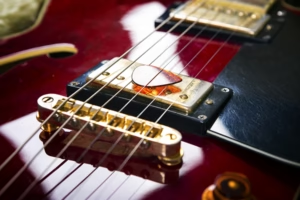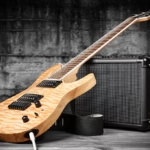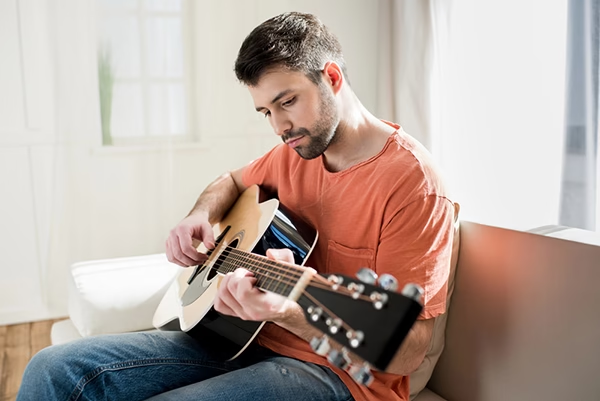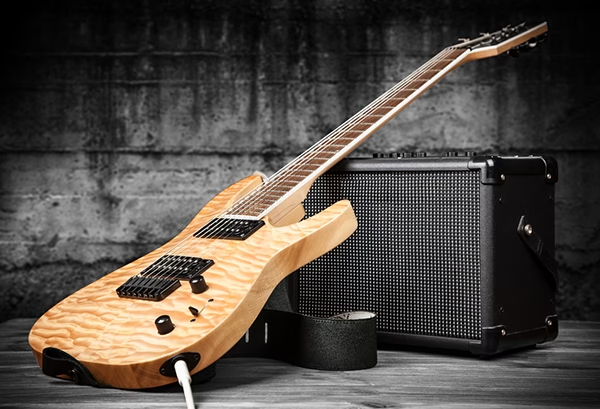Guitar Practice Mastery: 7 Life-Changing Habits for Musicians
1. The Psychology of Effective Guitar Practice
Every guitarist dreams of effortless mastery—but the truth is, guitar practice isn’t just about how many hours you play; it’s about how intentionally you practice. Studies on deliberate practice (Ericsson et al., 1993) show that quality focus trumps quantity every time. Instead of strumming mindlessly, divide your guitar practice into small, goal-oriented segments: tone work, scales, chord transitions, improvisation, and repertoire.
Use a timer to keep each section focused (e.g., 15 minutes per skill). This mirrors the “Pomodoro Technique,” proven to enhance retention and prevent fatigue. Think of each guitar practice session as a mental gym for your hands and brain—a place to refine precision, not chase perfection.
2. Create a Consistent Daily Routine
Building a guitar practice habit requires consistency more than intensity. Neuroscience confirms that habit loops—cue, routine, reward—strengthen with repetition. Choose a fixed time each day, ideally when your energy is highest. Morning players often find better focus before distractions arise, while night owls may prefer the calm of evening reflection.
Your daily guitar practice routine might look like this:
-
10 min: Finger warm-ups and stretching
-
20 min: Technique focus (alternate picking, legato, sweep picking)
-
15 min: Chord transitions and rhythm training
-
15 min: Learning new songs or solos
-
10 min: Creative free play
Document progress in a guitar practice journal—record tempos, note challenges, and celebrate small wins. Over time, this becomes your roadmap of growth.
3. Divide and Conquer with Smart Goals
The most successful guitar practice strategies use SMART goals: Specific, Measurable, Achievable, Relevant, and Time-bound. Instead of “I want to play faster,” say “I’ll increase my alternate picking speed from 100 BPM to 120 BPM in four weeks.” This creates measurable motivation.
Each week, evaluate and adjust. Research in performance psychology shows that micro goals enhance dopamine release, increasing persistence and enjoyment. Every target you hit—whether mastering a tricky barre chord or nailing vibrato control—builds momentum.
Keep your guitar practice goals realistic: stretching beyond your comfort zone, but not to the point of burnout.
4. Master Technique Through Mindful Repetition
Mindless repetition can kill motivation. Mindful repetition, however, transforms guitar practice into meditation. Focus on the tactile feel of strings, the precision of each note, and your body’s relaxation level.
Slow, conscious play engages your motor cortex more efficiently, according to research published in Frontiers in Human Neuroscience. Slowing down not only improves accuracy but also builds muscle memory faster.
A few mindful guitar practice methods:
-
Play scales at half speed with closed eyes.
-
Record and listen back for subtle timing flaws.
-
Visualize fretboard patterns without touching your guitar.
These small mental exercises condition your brain to anticipate the fretboard instinctively—making guitar practice feel effortless over time.
5. Integrate Theory, Ear Training, and Creativity
A holistic practice routine combines mechanics with musicianship. Learn the why behind the how. Understanding intervals, chord construction, and scales fuels creativity and improvisation.
Spend at least one session per week on:
-
Ear training: Try apps like Functional Ear Trainer or Teoria to identify intervals and chords.
-
Music theory: Practice harmonizing scales, building chord families, and transposing songs.
-
Improvisation: Jam over backing tracks using modes and phrasing dynamics.
When theory meets creativity, your guitar practice stops feeling mechanical. You’ll start hearing possibilities before you play them—an essential leap from guitarist to musician.
6. Break Plateaus with Science-Backed Variability
Every player hits a plateau. When guitar practice progress slows, the secret isn’t more effort—it’s variety. Research from motor learning theory suggests that changing context (tempo, key, position) improves adaptability and neural rewiring.
Try these strategies to reignite progress:
-
Variable tempo practice: Use a metronome that randomly fluctuates by ±5 BPM.
-
Alternate environments: Practice standing, sitting, or with backing tracks.
-
Genre rotation: Switch between blues phrasing, rock riffs, and jazz comping.
Breaking monotony reactivates your brain’s learning circuits and keeps motivation alive. Remember, guitar practice isn’t linear—it’s cyclical. Embrace the fluctuations.
7. Cultivate Motivation and Emotional Connection
Beyond skill, practice feeds the soul. Emotional engagement fuels persistence. Studies show that musicians who connect emotionally to their instrument practice up to 40% longer than those driven solely by discipline.
Here’s how to keep your emotional connection alive:
-
Play songs that inspire you, not just exercises.
-
Revisit the reason you picked up the guitar in the first place.
-
Reward yourself after milestones—a new pedal, fresh strings, or recording session.
Surround yourself with a community—online forums, jam groups, or lessons. Social accountability multiplies consistency. And remember: every time you sit down to guitar practice, you’re not just learning notes—you’re learning patience, focus, and artistry.
Conclusion: The Art of Lifelong Guitar Growth
Mastery isn’t about endless hours; it’s about meaningful practice—focused, intentional, and emotionally fulfilling. Whether you’re a beginner refining chords or a seasoned player exploring modal jazz, the principles remain the same: consistency, mindfulness, and curiosity.
Transform your guitar practice from a routine into a ritual. Show up daily, listen deeply, and evolve continuously. The guitar rewards those who respect its process—and every note played with intention brings you closer to your best musical self.
References:
-
Ericsson, K. A., Krampe, R. T., & Tesch-Römer, C. (1993). The role of deliberate practice in the acquisition of expert performance. Psychological Review.
-
Berklee College of Music. Effective Practice Strategies for Musicians
-
Fender Play Blog. How to Build the Perfect Guitar Practice Routine
-
MusicRadar. 10 Ways to Supercharge Your Guitar Practice








